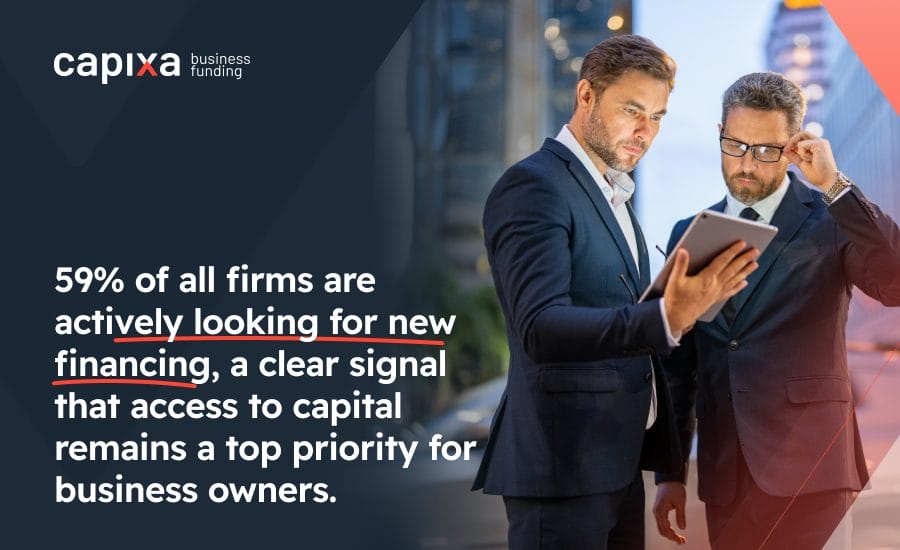Is a Small Business Loan Variable or Fixed Rate? Key Factors To Consider

Did you know that 64% of small business owners in the U.S. have used financing to maintain their business operations?
This percentage highlights the importance of choosing the right loan structure — and the decision is mostly between a small business loan with a variable or fixed rate.
Fixed-rate loans offer predictability and security, making them a popular choice for businesses that value stable monthly payments.
On the other hand, variable-rate loans generally start with lower initial payments and may save money if interest rates decrease over time.
Today, we’ll explore key factors to consider as you decide between the two options, helping you make an informed choice that aligns with your business’s needs.
Fixed-Rate vs. Variable-Rate Small Business Loans
If you’re planning for consistent monthly outflows, fixed-rate loans provide peace of mind by locking in the same interest rate for the entire loan period.
Meanwhile, variable-rate loans offer flexibility and the potential for lower costs if interest rates decline.
How stable you want to be and how willing you are to deal with potential changes in payment amounts may determine which of these rates you choose.
Most businesses with a steady income source prefer fixed-rate loans, while those that anticipate market fluctuations or expect to pay off their loans quickly will likely opt for variable-rate loans.
Pros of Fixed Rate Small Business Loans
Business owners looking for a stable and predictable financial plan will surely benefit from fixed-rate loans.
Some benefits of fixed-rate small business loans are:
1. Predictability in Monthly Payments
With a fixed-rate loan, you can count on your monthly payments not to change during the loan period.
For example, take a small retail business that has relatively steady, year-round sales.
To pay for the mortgage, utilities, payroll, and inventory restocking, businesses rely on tight budgeting. To attract more customers and increase revenue, they take out a fixed-rate loan to renovate their storefront.
2. Easier Long-Term Budgeting and Financial Planning
A fixed-rate loan is a valuable tool for businesses looking to accurately forecast their finances. As a result, you can plan for your short and long-term expenses more accurately.
For example, a custom furniture manufacturer needs new machinery to boost production but must manage cash flow carefully due to monthly expenses like supplier payments and rent. The owner opts for a fixed-rate loan, ensuring stable loan payments over time.
3. Protection Against Market Fluctuation
Even if a market is extremely volatile and if something like inflation happens, your fixed rate will stay the same.
For example, a small bakery takes out a fixed-rate loan to open a second location. Even if interest rates rise, their loan payments remain the same, helping them keep prices stable and avoid sudden cost increases.
4. Best Scenarios for Choosing a Fixed-Rate Loan
If you are looking to finance a long-term project, maintain a consistent income, or focus on steady growth without financial surprises, fixed-rate loans are an excellent option.
For example, a landscaping company targeting long-term expansion into commercial projects, with predictable seasonal income, may choose a fixed-rate loan. This option provides consistent payments throughout the life of the loan, allowing them to lock in a low rate in favorable market conditions.
Pros and Potential Risks of Variable-Rate Small Business Loans
Businesses seeking flexibility and willing to tolerate some market fluctuations can benefit from variable-rate loans.
Here’s how these loans can work in your favor:
1. Potential for Lower Initial Interest Costs
Variable-rate loans are one of the most appealing because you can get a lower initial interest rate.
A variable-rate loan may be a practical option if you need business funding right away but want to avoid high initial payments due to the lower starting costs.
For example, a newly opened restaurant may want to avoid high early costs but need fast funding to purchase kitchen equipment. By opting for a variable-rate loan, they can benefit from a lower initial interest rate, allowing them to allocate those funds toward marketing or supplies.
2. Opportunities To Benefit When Rates Decrease
If market rates fall, your interest rate will also be reduced, which in turn reduces your monthly payment.
For example, some tech startups may take out a variable-rate loan to develop a new app. As market rates drop, their interest rate drops too – lowering monthly payments and freeing up their cash to spend on user acquisition and growth.
3. Flexibility in Short-Term Financing
If you intend to pay back the loan quickly, the variable rate can be beneficial because you can save on initial interest charges and don’t need to worry about long-term rate increases.
For example, a seasonal events company needs a short-term loan to pay upfront costs related to a large-scale festival. While you incur initial savings on interest with a variable-rate loan, you won’t face long-term exposure to rate increases.
Risks Associated With Variable-Rate Loans
Potential risks with these types of rates are that higher interest rates will mean that your loan payments will be higher too, putting pressure on your budget and cash flow.
Variable-rate loans are best used by businesses that are prepared for potential changes in the interest rate.
For example, a construction company secured equipment with a variable-rate loan, but when the purchase rate unexpectedly increased, their monthly payments rose. While they initially benefited, they now face added pressure to maintain cash flow and manage costs.

Key Factors To Consider When Choosing Between Fixed and Variable Rates
Choosing between a fixed or variable rate is not just about today’s rates – it’s about what you will pay throughout your loan.
Consider the following:
Evaluate Your Business’s Cash Flow and Budget Stability
A business with a reliable income stream, predictable monthly expenses, and a fixed-rate loan can eliminate worry by locking in consistent payments moving forward.
Oppositely, if you’re in an industry with fluctuating earnings, such as seasonal retail, you may prefer a variable rate loan. The typically lower initial monthly payments can provide a financial safety cushion during lean months.
Interest Rate Trends and Economic Conditions
You can also look at current and projected interest rates. Consider, for instance, historically low rates. Signing up for a fixed-rate mortgage means you keep the benefit of those rates for a long time to come.
If you think rates will be lower down the road, a variable-rate loan may help you take advantage of potentially lower payments. To inform your choice, you can monitor economic conditions and market trends.
The choice you make will allow you to save on huge interest costs in the long run.
Loan Duration and How It Affects Rate Choice
For businesses wanting to avoid any surprises, a fixed rate is preferred when opting for a longer-term loan commitment (five years or more).
In contrast, if you’re seeking a short-term loan (one to three years), a variable rate may work better because any rate change is confined to a shorter period.
Let’s say you have got to borrow some money to quickly expand your business, a variable rate allows some upfront costs while streamlining repayment over a short period.
Impact on Monthly Payments and Total Interest Over Time
One benefit of getting a fixed-rate loan is that you do not have to rack your brain about fixed expenses because you can plan for exactly how much you will pay each month.
If you’ve got other long-term financial commitments, like leases or equipment payments, this consistency is good.

Consult Capixa To Find the Right Loan Type for Your Business
Capixa is an investment capital funding company that personalizes business lending, understanding your needs to find the best small business loan solution.
We aren’t limited to an industry and offer financing for various domains such as healthcare, real estate, restaurant, and construction.
If you’re running a small business and seeking support, Capixa offers:
- Custom solutions: Beyond transactions, we provide a full spectrum of loan solutions to meet your business’s needs while you make your business more strategic and profitable.
- Friendly service: We deeply believe in building lasting relationships with our clients. You are partners, not just customers, whose growth and success we are not only truly invested in but also encourage and support through the same friendly journey.
- An efficient approach: We hone our approach to ensure your loan application process is streamlined and as straightforward as possible, without unnecessary complexities.
- Transparent communication: You can trust us because we have an unwavering commitment to clear and transparent communication.
To apply for a small business loan at Capixa all you have to do is fill out our form, and our team will get in touch with you shortly.

![What Is a Small Business Loan [How it Works + Types of Loans]](https://capixa.com/wp-content/uploads/2024/09/what-is-a-small-business-loan-hero-image.jpg)
